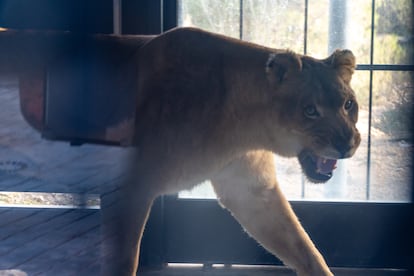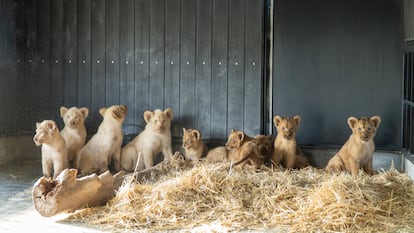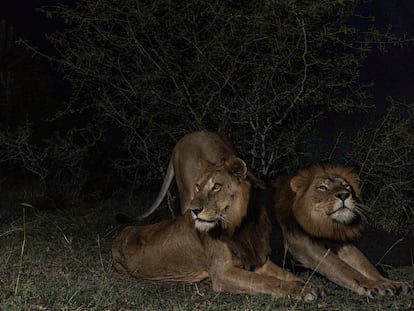Nine lion cubs and three adults rescued from French circus find shelter in Spain
The 12 felines will remain at the AAP Primadomus facilities in Villena, Alicante, until they recover and are placed in a reserve or zoo
On Monday, 12 lions, including nine cubs aged between three and five months, an 18-year-old male, and two females aged 10 and 12, arrived in Villena in the Spanish province of Alicante after a 20-hour road trip from a circus in western France. They are now resting and recovering at the facilities of AAP Primadomus, an animal shelter specializing in the rehabilitation of primates and big cats, where they will eventually be given suitable homes.
The cubs were born this summer in the circus, despite the fact that French legislation has prohibited the breeding, acquisition, or sale of wild animals in circus performances since December 2023. While circus acts with animals are still permitted in France until 2028, the owners of this particular circus had ceased using the lions in performances and were unable to care for them. According to AAP Primadomus, there was a high risk that the cubs would be sold to cover the maintenance costs of other animals in the circus.
“The lions ended up here because there are no such shelters in France, and we are a European organization committed to offering a better future for the animals,” explains Berta Alzaga, head of communications. When the lions arrived in Villena, they were covered in filth. Azaga explains that the animals had probably “been kept in trailers at the circus for at least the last month,” since they could not be taken out. And as it is “complicated” to clean the trailer with the lions inside it, they had been living in dirty conditions for several weeks.
The animals were initially very nervous upon arrival, especially the cubs, but once reunited with their mothers, they “calmed down,” says Pablo Delgado, director of AAP Primadomus Spain and head of big cats.

Now is the time to let the lions rest, recover, and undergo health checks. The cubs “seem quite thin, and we know they haven’t received veterinary care at the circus,” says Delgado. They also did not have the mandatory identification microchip, which was added during their transfer. The animals will undergo a quarantine period of at least one month at the rescue center, during which time they will remain confined and not allowed access to the larger 4,000-square-meter facilities. “Unfortunately, we have no choice but to keep them like this until we are sure that they are in good health, that they do not have any nutritional deficiencies, that they are free of parasites...,” Delgado explains.
The rescue operation was carried out in collaboration with the French authorities, who aimed to confiscate the animals, as well as with Code Animal, an AAP partner organization. The process was not without difficulty. A first attempt in October failed due to a lack of cooperation from the circus, which “led to a very tense situation.” After a month of negotiations, the circus owners agreed to hand over the animals voluntarily, thus avoiding the need for confiscation. Once the veterinarians deem the lions rehabilitated both physically and socially, they will be placed in permanent homes. “These could be animal sanctuaries, reserves, or accredited zoos. If we can’t find a suitable home, they will remain with us,” Alzaga explains.
AAP aims to raise awareness about the “devastating” consequences of using wild animals as “circus performers.” A study conducted by the foundation, titled The Darkness Behind the Spotlight, found that 89% of exotic animals rescued from such performances suffer mental or physical after-effects. The organization is working to improve animal welfare laws and is calling for a complete ban on animal circuses across Europe. This would prevent “more animals from being forced to perform, traveling between countries and suffering the same terrible fate that these cubs were destined for.” It would also address the current regulatory disparities between regions where such practices have been banned and those where they are still permitted.
In Spain, circuses with animals were banned last year with the approval of Law 07/2023 on the Protection of the Rights and Welfare of Animals. Prior to this, various municipalities, towns, and autonomous communities had gradually joined the ban. When the law came into effect, 12 Spanish regions had already abolished the practice, which meant that “75% of Spaniards lived in areas free from circuses with animals inside or outside.”
Sign up for our weekly newsletter to get more English-language news coverage from EL PAÍS USA Edition
Tu suscripción se está usando en otro dispositivo
¿Quieres añadir otro usuario a tu suscripción?
Si continúas leyendo en este dispositivo, no se podrá leer en el otro.
FlechaTu suscripción se está usando en otro dispositivo y solo puedes acceder a EL PAÍS desde un dispositivo a la vez.
Si quieres compartir tu cuenta, cambia tu suscripción a la modalidad Premium, así podrás añadir otro usuario. Cada uno accederá con su propia cuenta de email, lo que os permitirá personalizar vuestra experiencia en EL PAÍS.
¿Tienes una suscripción de empresa? Accede aquí para contratar más cuentas.
En el caso de no saber quién está usando tu cuenta, te recomendamos cambiar tu contraseña aquí.
Si decides continuar compartiendo tu cuenta, este mensaje se mostrará en tu dispositivo y en el de la otra persona que está usando tu cuenta de forma indefinida, afectando a tu experiencia de lectura. Puedes consultar aquí los términos y condiciones de la suscripción digital.
More information
Archived In
Últimas noticias
Most viewed
- Sinaloa Cartel war is taking its toll on Los Chapitos
- Oona Chaplin: ‘I told James Cameron that I was living in a treehouse and starting a permaculture project with a friend’
- Reinhard Genzel, Nobel laureate in physics: ‘One-minute videos will never give you the truth’
- Why the price of coffee has skyrocketed: from Brazilian plantations to specialty coffee houses
- Silver prices are going crazy: This is what’s fueling the rally












































